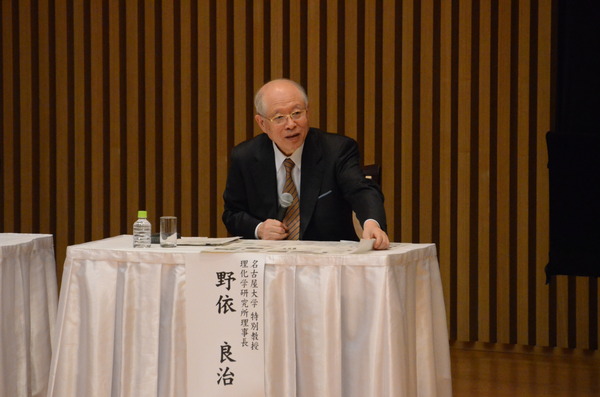The Nagoya University Lecture Series was held on February 1, 2014, and University Professor Ryoji Noyori, a Nobel Laureate in Chemistry (2001), gave a lecture to an audience of over 1,200 people on the topic, "Where science goes"? He looked back over his life and brought up an issue regarding the manner in which universities work. Prof. Noyori described the twentieth century as the age of competition and the twenty-first century as the age of cooperation. He explained the importance of dialogue and cooperation between universities and society, and declared that the mission given by society to universities is to develop innovations for a better society. He described his critical feelings against current academia and asked researchers to be much humbler to the public. He closed the lecture with a message to the younger generation asking them to think of society in the next generations.

Following the lecture, Prof. Noyori, students, and other lecturers ran a panel discussion regarding the role of younger generations in science and technology.
Maya Morishita (high school junior)
I feel that in the twenty-first century, some people are benefited by science and technology, whereas others suffer as a result of it. I believe we need to tackle this pressing issue. What do you think about the negative impacts of science and technology?
Prof. Noyori
Scientists must give much thought to survival and progress of the human race, and must become more humble. Also, it is important to make science understandable by people outside academia and to tell them what our environment suffers from scientifically. What is important for scientists is to deal amenably with social issues. I hope that they continue asking themselves why they are studying science and maintain justice in research.
Shang Li (freshman at the graduate school of science)
Students in the twenty-first century have to learn everything found in the past. Do you think it has become more difficult to be a researcher today than it was in the past?
Prof. Noyori
Certainly, the level of scientists has reached a higher level than the past. We have more high-performance devices for research. However, I am concerned with current researchers who rely too much on such devices. I feel that many of them are used to too much automation. Also, recently there is more of an emphasis on competition in academia. I believe that competition is not essential in science. We need to understand our place in society.
Shiho Kato (freshman at the graduate school of Law)
In the lecture you emphasized the role of scientists in the survival of the human race. What do you think of the concomitance of universal science and the concept of nation?
Prof. Noyori
I believe that the twenty-first century is the age of cooperation. However, it does not mean scrambling everything. We should seek a good mix to achieve innovations. To this end, each person needs to understand their own character and find the best way to cooperate with others. I hope that you would think seriously about the meaning of your life, as well as the meaning of nation and state.
Dr. Mie Sasaki (associate professor at the graduate school of science)
It takes a long time for research to see the light of day. How do you find a diamond in the rough?
Prof. Noyori
It is important to discover new values, as well as to find out facts. When you find a fact, you can understand it in various ways. I believe scientists ought to accommodate facts and values, giving consideration to what society really wants.
Maya Morishita
In conclusion, what do you expect from younger generations?
Prof. Noyori
I hope you would pass on a better world to the next and future generations, and cultivate long-term perspectives.